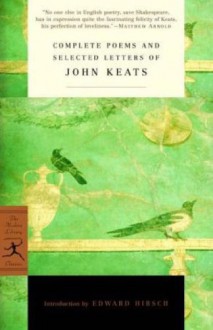Complete Poems and Selected Letters
'I think I shall be among the English Poets after my death,' John Keats soberly prophesied in 1818 as he started writing the blankverse epic Hyperion. Today he endures as the archetypal Romantic genius who explored the limits of the imagination and celebrated the pleasures of the senses but...
show more
'I think I shall be among the English Poets after my death,' John Keats soberly prophesied in 1818 as he started writing the blankverse epic Hyperion. Today he endures as the archetypal Romantic genius who explored the limits of the imagination and celebrated the pleasures of the senses but suffered a tragic early death. Edmund Wilson counted him as 'one of the half dozen greatest English writers,' and T. S. Eliot has paid tribute to the Shakespearean quality of Keats's greatness. Indeed, his work has survived better than that of any of his contemporaries the devaluation of Romantic poetry that began early in this century. This Modern Library edition contains all of Keats's magnificent verse: 'Lamia,' 'Isabella,' and 'The Eve of St. Agnes'; his sonnets and odes; the allegorical romance Endymion; and the five-act poetic tragedy Otho the Great. Presented as well are the famous posthumous and fugitive poems, including the fragmentary 'The Eve of Saint Mark' and the great 'La Belle Dame sans Merci,' perhaps the most distinguished literary ballad in the language. 'No one else in English poetry, save Shakespeare, has in expression quite the fascinating felicity of Keats, his perception of loveliness,' said Matthew Arnold. 'In the faculty of naturalistic interpretation, in what we call natural magic, he ranks with Shakespeare.'
show less
Format: paperback
ISBN:
9780375756696 (0375756698)
ASIN: 375756698
Publish date: February 13th 2001
Publisher: Modern Library
Pages no: 640
Edition language: English
Category:
Classics,
Non Fiction,
Academic,
School,
Literature,
European Literature,
British Literature,
Anthologies,
Collections,
19th Century,
Poetry

The introduction speaks of Keat's "verbal sumptuousness" and that's apt--particularly if you read these out loud, they're a feast for the ears. That said, I didn't love everything. I was less than wild about Keats' two longest poems, particularly the longest, Endymion, which at over a hundred pages ...

In my eyes, Keats can do no wrong. I love this man. Heartbreakingly gorgeous stuff here, folks.






 12 years ago
12 years ago




 15 years ago
15 years ago